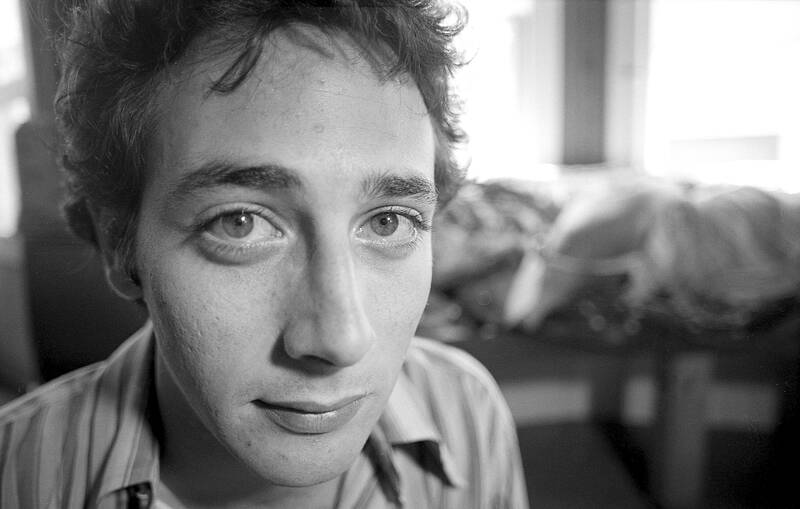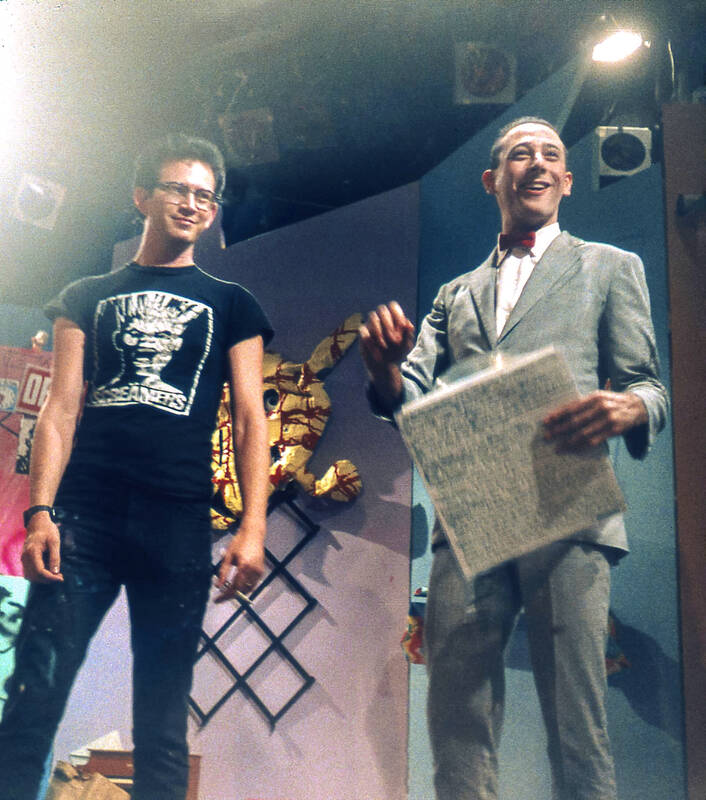Some bio documentaries are carried mostly by the reflective, archival footage that sends you back to the subject’s heyday.
But in Matt Wolf’s Pee-wee as Himself — as wonderful as much of the archival stuff is — is more compelling than when Paul Reubens is simply himself.
Before his death from cancer in 2023, Reubens sat for 40 hours of interviews with Wolf. His cooperation is clearly uncertain and sometimes strained in the film — he stopped participating for a year before talking about his infamous 2001 arrest — and his doubts on the project linger throughout.

Photo: HBO Max via AP
Reubens would rather be directing it, himself, he says more than once. The man many know as Pee-wee Herman is used to controlling his own image, and he has good reason for being skeptical of others doing so. But beyond that tension over authorship of his story, Reubens is also delightfully resistant to playing the part of documentary cliche.
“I was born in 1938 in a little house on the edge of the Mississippi River,” he begins. “My father worked on a steamboat.”
Talking heads have gotten a bad rap in documentaries in recent years, but in Pee-wee as Himself, nothing is more compelling than Paul Reubens simply sitting before the camera, looking back at us.

Photo: HBO Max via AP
Pee-wee may be iconic, but Paul Reubens is hysterical. And Wolf’s film, with that winking title, makes for a revealing portrait of a performer who so often put persona in front of personhood. In that way, Pee-wee as Himself, a two-part documentary premiering Friday on HBO and HBO Max, is moving as the posthumous unmasking of a man you can’t help but wish we had known better.
Reubens was a product of TV. He grew up transformed by shows like Howdy Doody, The Mickey Mouse Club and, later, I Love Lucy.
“I wanted to jump into my TV and live in that world,” he says.
Part of the delight of the first half of Wolf’s film is watching the wide range of inspirations — the circus culture of Sarasota, Florida, where his family moved to; Andy Warhol; performance art — coalesce into a singular creation like Pee-wee. That name, he says, came from a tiny harmonica that said Pee-wee on it, and a kid named Herman he knew growing up.
“It was a whole bunch of things that had never really connected connecting,” says Reubens.
Wolf carefully traces the birth of Reubens’ alter-ego through the Groundlings in Los Angeles, on stage at the Roxy and then out into the world, on The Gong Show, on Letterman, in the 1985 Tim Burton-directed Pee-wee’s Big Adventure and, ultimately, on Pee-wee’s Playhouse.
“I felt in a way I was bringing the character out into the wild,” he recalls. “I just stayed in character all day.”
That came with obvious sacrifices, too. For the sake of his career, Reubens stayed closeted as a gay man. He grew intensely private and seldom appeared in public not in character. Reubens also jettisoned some of his close collaborators, like Phil Hartman, as his fame grew. There’s tragedy, both self-inflicted and not, in Reubens’ increasing isolation.
When Reubens was arrested in 1991 and charged with indecent exposure, Reubens’ carefully guarded persona came crashing down. The scandal was worse because people knew only Pee-wee and not Reubens. There was also injustice in the whole affair, particularly the 2002 arrest that followed on charges of child pornography that were later dropped. In both cases, homophobia played a role.
When Reubens does get around to talking about it, he’s most resistant to painting himself as a victim, or offering any, as he says, “tears of a clown.”
Wolf, the director of films like Recorder, about Marion Stokes, who recorded television all day long for 30 years, and Spaceship Earth, about the quirky 1991 Biosphere 2 experiment, is better known as a talented documentarian of visual archives than as an compelling interviewer of celebrities.
Pee-wee as Himself would have probably benefited from less one-sided interplay between subject and filmmaker. But Wolf’s time was also limited with Reubens and just getting this much from him is clearly an accomplishment.
Above all, Reubens says he’s doing the film to clear a few things up. In the end, the full portrait of Reubens — including all his playful, self-deprecating charm in front of the camera — add up to a much-needed retort to some of the misunderstandings about Reubens.
The day before he died, Reubens called Wolf to say one last thing: “I wanted to let people know who I really was and see how painful it was to be labeled as something I wasn’t.”

The Lee (李) family migrated to Taiwan in trickles many decades ago. Born in Myanmar, they are ethnically Chinese and their first language is Yunnanese, from China’s Yunnan Province. Today, they run a cozy little restaurant in Taipei’s student stomping ground, near National Taiwan University (NTU), serving up a daily pre-selected menu that pays homage to their blended Yunnan-Burmese heritage, where lemongrass and curry leaves sit beside century egg and pickled woodear mushrooms. Wu Yun (巫雲) is more akin to a family home that has set up tables and chairs and welcomed strangers to cozy up and share a meal

Dec. 8 to Dec. 14 Chang-Lee Te-ho (張李德和) had her father’s words etched into stone as her personal motto: “Even as a woman, you should master at least one art.” She went on to excel in seven — classical poetry, lyrical poetry, calligraphy, painting, music, chess and embroidery — and was also a respected educator, charity organizer and provincial assemblywoman. Among her many monikers was “Poetry Mother” (詩媽). While her father Lee Chao-yuan’s (李昭元) phrasing reflected the social norms of the 1890s, it was relatively progressive for the time. He personally taught Chang-Lee the Chinese classics until she entered public

Last week writer Wei Lingling (魏玲靈) unloaded a remarkably conventional pro-China column in the Wall Street Journal (“From Bush’s Rebuke to Trump’s Whisper: Navigating a Geopolitical Flashpoint,” Dec 2, 2025). Wei alleged that in a phone call, US President Donald Trump advised Japanese Prime Minister Sanae Takaichi not to provoke the People’s Republic of China (PRC) over Taiwan. Wei’s claim was categorically denied by Japanese government sources. Trump’s call to Takaichi, Wei said, was just like the moment in 2003 when former US president George Bush stood next to former Chinese premier Wen Jia-bao (溫家寶) and criticized former president Chen

President William Lai (賴清德) has proposed a NT$1.25 trillion (US$40 billion) special eight-year budget that intends to bolster Taiwan’s national defense, with a “T-Dome” plan to create “an unassailable Taiwan, safeguarded by innovation and technology” as its centerpiece. This is an interesting test for the Chinese Nationalist Party (KMT), and how they handle it will likely provide some answers as to where the party currently stands. Naturally, the Lai administration and his Democratic Progressive Party (DPP) are for it, as are the Americans. The Chinese Communist Party (CCP) is not. The interests and agendas of those three are clear, but